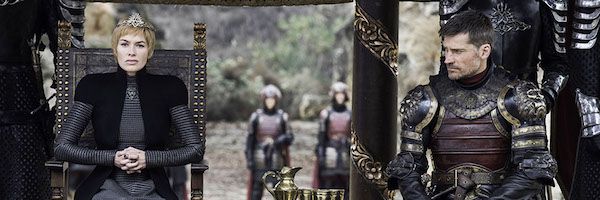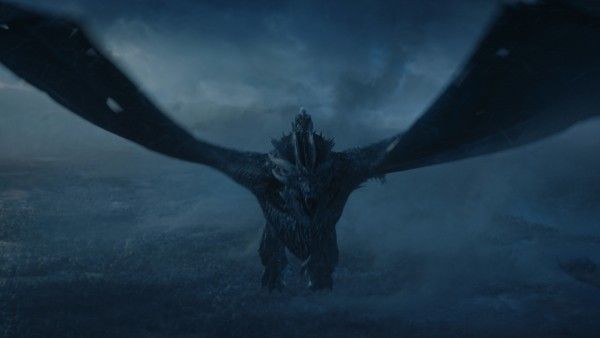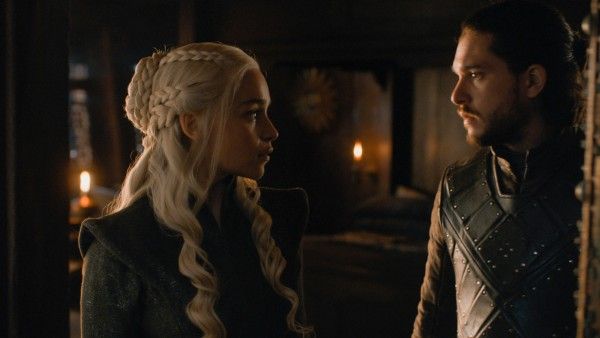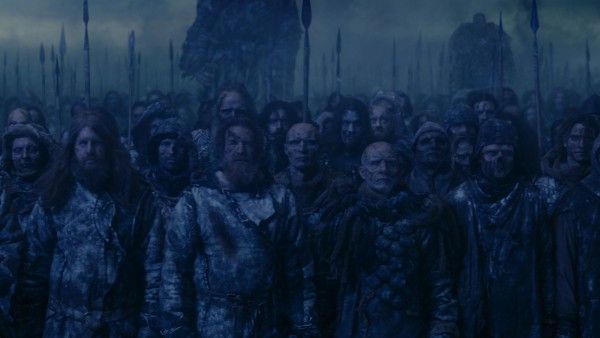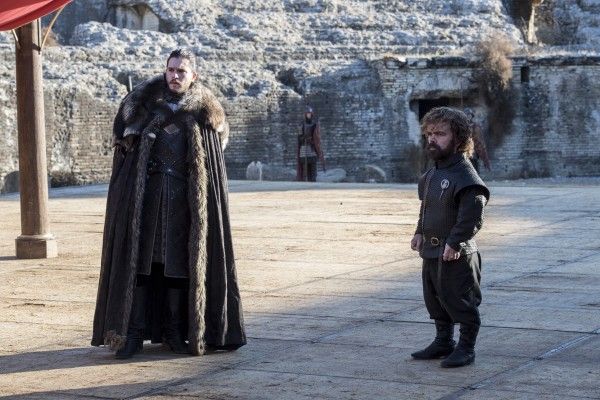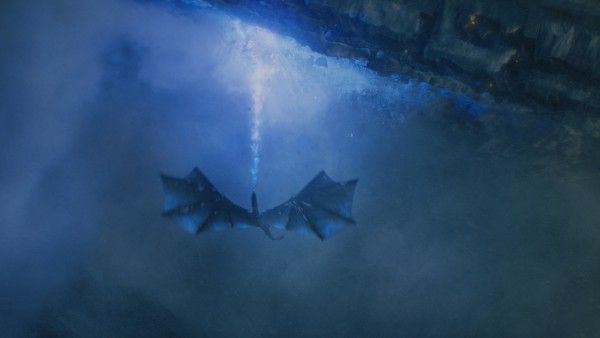Game of Thrones’ penultimate season is now at a close, and we officially have a zombie dragon. The Season 7 finale brought a lot of things to a head that were set up earlier in the season—from that tense meeting with all the characters to Jon and Dany finally bumpin’ uglies—but as viewers noticed from the very beginning, this truncated season started playing by new timeline rules. While it used to take entire seasons for characters to move from Point A to Point B, this season saw characters go from A to B to A again in the span of a single episode, all in service of expediting the storytelling. We expected things to move a bit faster given that this season consisted of only seven episodes instead of the usual 10, but the quickness on display in Season 7 was not only whiplash-inducing at times, it also resulted in some questionable narrative shortcuts.
Indeed, one imagines when showrunners David Benioff and D.B. Weiss sat down to breakdown Season 7, they knew they wanted a few key things to occur by the end of the season, chiefly the Night King in possession of a zombie dragon, a romance between Jon and Daenerys consummated, and a big sitdown with all the major characters. But whereas Game of Thrones used to take seasons to play out these long arcs, especially when characters are very far apart to begin with, all of this came together in the span of a few episodes.
One of the bigger complaints about Season 7 came in the penultimate episode, “Beyond the Wall.” In hindsight, it’s clear that this episode’s purpose was to get a zombie dragon into the possession of the Night King and to give the characters an excuse to go meet Cersei. But this “Operation Zombie Drop” plan seemed boneheaded from the get-go—Cersei has shown herself to be ruthless, sociopathic, and narcissistic, so why in the world would these characters think showing her a zombie would change her mind? Cersei’s most important character trait is that she lacks empathy for anyone not named “Lannister”! The inevitable rescue by Dany on the back of her dragon was obvious from the get-go (The show’s not going to kill Jon Snow again, and how else is the group expected to escape the massive ice zombie horde?), and so an episode that should have been full of tension and shocking deaths instead felt like a bit like a paint-by-numbers approach to storytelling.
But as we saw at the end of “The Dragon and the Wolf,” the end of “Beyond the Wall” was, as expected, a tee-up to give the Night King his own dragon. And with a dragon in his possession, the Night King can finally tear down that wall. This was, admittedly, a pretty badass sequence, and one the show has been building to for years. But was it worth the “Operation Zombie Drop” storytelling shortcut to get there? And what was the Night King’s plan for getting across the wall these past six seasons without a zombie dragon in his possession? Was he marching towards the Wall in the hopes that he’d just kind of figure it out when he got there?
Then there’s the Jon/Dany romance. Of course as we get towards the finish line, Game of Thrones isn’t going to be quite as shocking as it was in earlier seasons, because the ramifications of certain decisions lead to a conclusion, not more story. And the “Song of Ice and Fire” moniker should’ve tipped everyone off that Game of Thrones, ultimately, is a story about Jon and Dany. But again the fast-forwarded storytelling this season really pushed these two strangers and former dueling Iron Throne contenders into a quick “meet cute/conflict/resolution” arc that culminated in the duo having all the #BoatSex. Was the coupling of Jon and Dany worth the jarring timeline shifts at Dragonstone? This one’s tough to say, given that the Jon/Dany storyline very much seems to be the heart of the final season, and indeed matters will be further complicated when Jon realizes that not only is he the true born heir to the Iron Throne, but that Dany is his aunt. A super hot aunt to be sure, but his aunt nonetheless.
Since the conclusion of Season 5, Game of Thrones has squarely been in off-book territory. We know that author George R.R. Martin shared the rough outline of what happens at the end of his book series with Benioff and Weiss, but these two showrunners have now been going it alone for two seasons. And in this penultimate season, it felt like the two were starting to take some shortcuts for the sake of ending this thing once and for all, in marked contrast to the feel of the show beforehand. To be fair, shortcuts are a part of storytelling sometimes, but usually you hope the viewer/reader is invested enough in the characters/story that they won’t care. But Season 7 felt chock-full of calculated decisions meant to put things in place for some kind of payoff, which is the nature of writing fiction to be sure, but here you could really feel how everything was in service of hitting certain plot points at certain times.
At the end of the day the question is whether you buy into the story and characters enough to forgive these shortcuts, or if they were too big to be ignored. Plenty of folks are fine just being entertained by the blockbuster visuals of Game of Thrones, and a zombie dragon breathing blue fire may be all the payoff you need. That’s completely understandable. But as someone who’s been more intrigued by the dialogue scenes and character machinations, I felt Season 7’s shortcuts jarring. Does this mean I’m sitting out the final season and not watching in protest? Puh-leeze. But like the seemingly unbeatable zombie horde marching towards humanity, the series’ increasingly plot-driven focus on spectacle feels like it’s leaving its soul behind.
For more on Game of Thrones, peruse our finale coverage below.
- ‘Game of Thrones’ Season 7 Finale Recap: “The Dragon and the Wolf”
- ‘Game of Thrones': What Does Jon Snow’s True Name Tell Us?
- 'Game of Thrones' Showrunners Break Down the Season 7 Finale & Tease Season 8
- ‘Game of Thrones': The Wall’s History and Magic Explained

